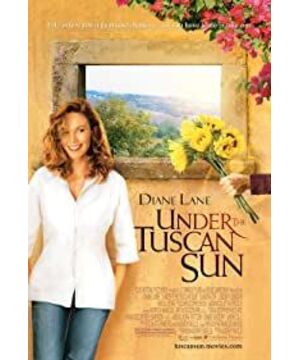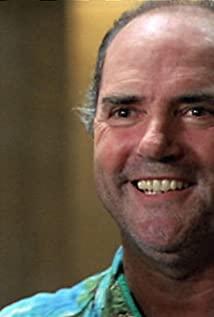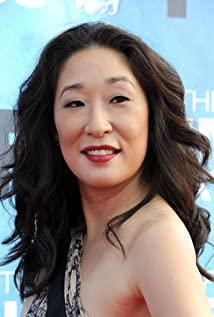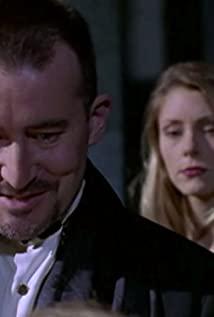In all love-themed movies, 80 to 90 percent of the plots make people believe in love in the end. It's not difficult, and it's even the reason why many people like to watch this type of movie.
However, the impact of such films on men and women is not exactly the same. A more rational man will not bring his cognition into reality at all after reading it, while women are not only deeply influenced by it, but also easily shape their cognition of reality.
Why? Because women are taught to be kind and to believe in fairy tales, starting from girls. Kindness is indeed a rare quality of human beings, worthy of recognition. Because of its preciousness, it seems a little dangerous in this cruel world. Moreover, I think that in essence, people who believe in fairy tales and people who believe in love are the same group of people.
The Italian love movie "Under the Tuscan Sun" tells a story that believes in fairy tales. The heroine Francis is a successful American female writer. Unexpectedly, her husband cheated. After the two divorced, the house was returned to her husband. Frustrated, she traveled to Tuscany, Italy, on the advice of a friend. Francis bought a house here by chance, met a group of local friends, and began to slowly get out of the shadow of divorce and enjoy life here.
It was originally a trip to restore Francis' confidence in love and life. But after looking back, I found that the answers given in the movie did not impress me as before. On the contrary, the process of watching the movie made me think a little bit.
The choice of independent, intelligent women
From the perspective of Francis' image setting, he originally represented the type of rationality and anti-romanticism. There is a plot at the beginning of the movie where a male writer complains that she has written a bad review of her own book at a writers' party. Listening to that description, it should be a romantic book.
Because he is rational and independent, Francis did not show hysteria in the face of divorce. Instead, he showed his sense of humour. Personally, I don't think such people really need romance.
Is it easier for people who are not romantic to get out of the blow? No, it's just that some acts look straight. During the transition period when there was no house to live in, she chose to live in an apartment full of divorcees. As soon as the door was closed, she fell to the ground, and her rationality could only support her here.
The plot has developed here, and with Francis's choice, it is impossible to touch the romantic love story at all. At this time, a friend with a romantic spirit comes in handy. Under the persuasion of his lesbian friends, Francis embarks on a journey to regain his true love.
In fact, recall that no matter how rational a person is, there will always be some idealistic friends around him or her. You will be shaken, you will be persuaded. Sometimes you win, sometimes a friend wins. Life is so wonderful, there is always a space between ideals and irrationality. I feel that many stories appear only after taking advantage of this loophole.
rebuild self-worth
From the first day Francis set foot in Tuscany, she was unknowingly accepting new values. She found that, compared with the actual United States, Italy is more inclusive, people enjoy life to the fullest, and possibilities are everywhere. She has always been rational, but she actually bought a house on the first day.
The first person to influence Francis was an Italian woman. She is beautifully dressed and passionately devoted to the love of men and women. It was she who taught Francis that childlike enthusiasm should always be maintained.
Then came the male real estate manager, who helped Francis a lot when he first arrived. His appearance gave Francis a sense of security, and even made her mistakenly believe that this was her new reliance. Obviously, his role is more of a masculine perspective to re-encourage Francis. For a straight girl, it may be unaccustomed to have such a male character in life, who is warm and responsible for her family, but not a partner. But that's how human beings are sometimes.
Next are the men who repaired Francis' house. Their presence gave Francis a more stable source of security. They were like a group of family members, active in her life. A person's loneliness cannot be eliminated by the appearance of a single person, but when you are lonely, surrounded by a group of people, that kind of happiness is enough to fill the emptiness.
Francis also broke through previously insurmountable barriers. I don't think she's one of those people who can start a relationship intuitively. After some struggles, her heart was finally opened by an Italian man. This ambiguous choice is, at best, an affair. But she needs a relationship like this to "reinvigorate morale". Although she knew she was taking a risk, she became more serious later.
At this time, she also rediscovered her own value: the charm of being a woman. She realized that it was right to start a new life, and it was right to believe in passionate love.
Even a young couple she knew locally was telling her with actions that she should believe in the beauty of love.
Seeing the heroine so desperate, it's like seeing the self who believed in love, but in fact there is still a little hesitation in my heart: should I believe in my intuition, in love, in fairy tales?
The one who chose the "right" in the first place?
Italian love movies have never been just a model of romantic love. Here, Francis' tortuous love has yet to see the light of day. In fact, the Italian man is not a single-minded person, and Francis' love comes to an abrupt end again. The desperate love experiment failed, and the healing journey returned to its original point.
So here, the question for Francis becomes: Do you choose the right person in the first place? I think she actually knows which kind of person she likes in her heart, but she is not sure, or she is hesitating, whether to choose to believe in the fate arranged by God for her.
When Francis first knew that the renovation worker and a little girl liked each other, she would feel that the two were impulsive, indicating that her attitude towards love was more rational. Coupled with the blow of the previous divorce, she actually has no confidence in such an easy-to-begin love.
Starting from Francis's psychology, she may have such doubts in her heart: it seems that being in a relationship with the right person from the beginning will make people more confident. As for what is the right person, I think at least everyone has some standards in their hearts, which can more or less rule out some wrong answers.
The movie doesn't give an answer, but at the end of the credits Francis has another "worthy" person. I don't know if there is a foreshadowing at the end of the film, the new man is a romantic writer like her ex-husband. I don't think this is a hint that Francis isn't necessarily happy yet?
In general, despite the whole film's ostensible sense of having faith in a new life, I think it's important for women to stay sane.
It's right to come out of emotional setbacks and start a new life, but believing in too passionate love or having too many expectations for romantic love turns reality into a fairy tale. Who doesn't want to be a character in a fairy tale? But you must know that no matter who you are, you need to have the courage to protect the fairy tale first. Not only do you have to protect yourself, but you also have to protect your other half and your beliefs.
I believe that fairy tales are very brave, and it takes responsibility to keep fairy tales. Just like the male real estate manager in the movie, he kept his responsibility to the family, which itself is a fairy tale that exists in reality. As a woman, shouldn't we pursue this kind of fairy tale?
View more about Under the Tuscan Sun reviews











